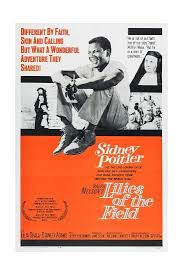
Movie 1 — Lillies of the Field (1963), starring Sidney Poitier
Lilies of the Field is a 1963 film adapted by James Poe from the 1962 novel of the same name by William Edmund Barrett, and stars Sidney Poitier, Lilia Skala, Stanley Adams, and Dan Frazer. It was produced and directed by Ralph Nelson. The title comes from Matthew 6:27-33, a portion of the Sermon on the Mount, and its parallel scripture from Luke 12:27-30. It also features an early film score by prolific composer Jerry Goldsmith.[3] The film was turned into a Broadway musical in 1970, retitled Look to the Lilies, with Shirley Booth in the role of Mother Maria Marthe.
When traveling African-American handyman Homer Smith (Sidney Poitier) stops by a farm in rural Arizona, he is welcomed by a group of Roman Catholic nuns who have emigrated from Germany. Realizing that the farm needs a lot of work, Homer takes on a number of repair projects for the women, who are led by the headstrong Mother Maria (Lilia Skala). Impressed by Homer’s kindness and strong work ethic, the nuns come to believe that he has been sent by God to help build them a chapel.
Before there was Denzel, there was Sidney
Sidney Poitier was born on February 20, 1927, in Miami, Florida. After a delinquency-filled youth and a short stint in the U.S. Army, Poitier moved to New York to pursue an acting career. He joined the American Negro Theater and later began finding roles in Hollywood. Following his performance in the 1963 film Lilies of the Field, he became the first African-American to win an Academy Award for Best Actor. He also directed several films, including Buck and the Preacher and Stir Crazy. The acclaimed actor was knighted in 1974 and honored with the Presidential Medal of Freedom in 2009.
Poitier made his Hollywood debut in the 1950 feature film No Way Out, and he followed in 1951 with Cry, the Beloved Country, a drama set in South Africa during the time of apartheid. He enjoyed a career breakthrough in 1955 with the popular Blackboard Jungle, portraying a troubled but gifted student at an inner-city school.
Poitier’s success as an actor reached new heights when he scored an Academy Award nomination for the 1958 crime drama The Defiant Ones, with Tony Curtis. The following year, he lit up the screen as a leading man in the musical Porgy and Bess, co-starring with Dorothy Dandridge. Both this film and his impressive turn in the 1961 film adaptation of A Raisin in the Sun helped make the actor a top star.
In 1967, Poitier delivered three very different yet equally strong performances. He played Philadelphia detective Virgil Tibbs in the Southern crime drama In the Heat of the Night. In Guess Who’s Coming to Dinner he played a black man engaged to a white woman in this groundbreaking look at interracial marriage. Katharine Hepburn and Spencer Tracy played his fiancée’s parents in the film. He also starred as inner-city teacher Mark Thackeray in the British film To Sir, with Love. The film finds Thackeray navigating racial and socioeconomic friction between rebellious and unruly students and winning their respect in the end.

Hollywood icon Sidney Poitier was the first African-American to win an Academy Award for Best Actor, receiving the honor in 1964 for his performance in ‘Lilies of the Field.’
Sidney Poitier’s Films
Early Career: ‘No Way Out’ to ‘Blackboard Jungle’
Poitier made his Hollywood debut in the 1950 feature film No Way Out, and he followed in 1951 with Cry, the Beloved Country, a drama set in South Africa during the time of apartheid. He enjoyed a career breakthrough in 1955 with the popular Blackboard Jungle, portraying a troubled but gifted student at an inner-city school.
Oscar Nom for ‘The Defiant Ones’ and Win for ‘Lillies of the Field’
Poitier’s success as an actor reached new heights when he scored an Academy Award nomination for the 1958 crime drama The Defiant Ones, with Tony Curtis. The following year, he lit up the screen as a leading man in the musical Porgy and Bess, co-starring with Dorothy Dandridge. Both this film and his impressive turn in the 1961 film adaptation of A Raisin in the Sun helped make the actor a top star.
In 1964, Poitier claimed the Best Actor Academy Award for his performance in Lilies of the Field (1963)—the first win by an African-American actor in this category. The accolade helped make Poitier cinema’s first Caribbean-American superstar, one who consciously defied racial stereotyping.
‘Heat of the Night,’ ‘Guess Who’s Coming’ and ‘To Sir, with Love’
In 1967, Poitier delivered three very different yet equally strong performances. He played Philadelphia detective Virgil Tibbs in the Southern crime drama In the Heat of the Night. In Guess Who’s Coming to Dinner he played a black man engaged to a white woman in this groundbreaking look at interracial marriage. Katharine Hepburn and Spencer Tracy played his fiancée’s parents in the film. He also starred as inner-city teacher Mark Thackeray in the British film To Sir, with Love. The film finds Thackeray navigating racial and socioeconomic friction between rebellious and unruly students and winning their respect in the end.
While he helped break down the color barrier in film and brought dignity to the portrayal of noble and intelligent characters, Poitier found himself under fire for not being more politically radical in the late 1960s. He was especially upset by a harsh article about him in The New York Times and decided to step out of the spotlight, choosing to live in the Bahamas for a time before making his return to Hollywood.
In 1972 Poitier made his directorial debut and co-starred with his friend Harry Belafonte in the Western Buck and the Preacher. The pair also appeared together in the 1974 comedy Uptown Saturday Night, the first of several Poitier-directed efforts that featured Bill Cosby. In 1980, Poitier helmed the Richard Pryor–Gene Wilder comedy Stir Crazy, which became the highest grossing film by an African-American director for many years.
‘Shoot to Kill’ and Other Late Roles
After a roughly 10-year absence from the big screen as an actor, in 1988 Poitier returned with a pair of dramas—Shoot to Kill and Little Nikita. Other notable later films include Sneakers (1992) and One Man, One Vote (1997). On the small screen, Poitier earned accolades for portraying some of history’s famous men. He played U.S. Supreme Court Justice Thurgood Marshall in Separate but Equal in 1991 and opposite Michael Caine as South African leader Nelson Mandela in Mandela and De Klerk in 1997.
Early Years in Miami and the Bahamas
Sidney Poitier was born on February 20, 1927, in Miami, Florida. He arrived two and a half months prematurely while his Bahamian parents were on vacation in Miami. As soon as he was strong enough, Poitier left the United States with his parents for the Bahamas. There Poitier spent his early years on his father’s tomato farm on Cat Island. After the farm failed, the family moved to Nassau, when Poitier was around the age of 10.
In Nassau, Poitier seemed to have a knack for getting himself into trouble. As a result, his father decided to send the teenager to the United States for his own good and Poitier went to live with one of his brothers in Miami. At age 16, Poitier left the South for New York City, where he worked menial jobs to support himself, until he found his life’s passion.
Books and Honors
Turning his attention to sharing his many personal experiences, Poitier in 2000 published The Measure of a Man, which was billed as a spiritual autobiography. That same year he picked up a Grammy Award for best spoken word album for the audio version of the book. He later shared his years of wisdom for future generations with 2008’s Life Beyond Measure: Letters to My Great-Granddaughter.
Poitier has received numerous honors during his legendary career. He was appointed a Knight Commander of the British Empire in 1974, which entitles him to use the title “sir,” though he chooses not to do so. In 2009 he received the Presidential Medal of Freedom from President Barack Obama. Two years later he was feted by the Film Society of Lincoln Center, earning the organization’s Chaplin Lifetime Achievement Award.
Poitier has also served as non-resident Bahamian ambassador to Japan and to the United Nations Educational, Scientific and Cultural Organization.
Sidney Poitier Mini Biography
Author
Biography.com Editors
Publisher
© 2020 Biography and the Biography logo are registered trademarks of A&E Television Networks, LLC.


